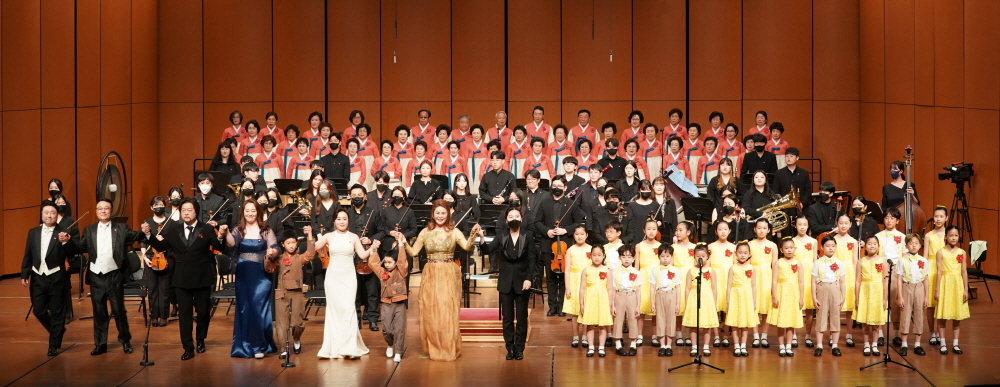Songs of healing and hope for Jeju, Yeosu-Suncheon, and Gwangju
News
Songs of healing and hope for Jeju, Yeosu-Suncheon, and Gwangju
Special concert held on the 74th anniversary of 4·3 and 10·19 and the 42nd anniversary of 5·18

A concert to heal the painful history and usher in new hope was held in the three regions of Jeju, Yeosu, and Gwangju.
Under the theme “Again, in Spring, Dreaming of Hope with You,” the special concert commemorated the 74th anniversary of Jeju 4·3 and Yeosu-Sunchon 10·19 (Yeo-Sun 10·19) and the 42nd Anniversary of the May 18 Democratization Movement (5·18 Gwangju Democratization Movement). Starting with a performance on April 28 at the Jeju Arts Center, the commemorative event then moved to the Yeulmaru Arts Center in Yeosu (I assume) the following day, ending with the final performance on May 24 at the Bitgoeul Citizen (Citizens?) Cultural Center in Gwangju.
The purpose of the special concert is to heal the wounds of Jeju 4·3 victims and share the values of peace, human rights, democracy, and integration through the 5·18 Gwangju Democratization Movement and Yeo-Sun 10·19. It was hosted by the Ministry of Culture, Sports and Tourism and the Gwangju Metropolitan Government, and was organized by the Jeju 4·3 Peace Foundation, Gwangju Cultural Foundation (CEO: Hwang Pung-nyun), and Yeosu Symphony Orchestra (Representative: Moon Jeong-suk). The Gwangju Culture and Art (not Arts?) Center and Gwangju Metropolitan Opera for You (That’s its official name?) co-sponsored the event. Of the songs performed on the stage, “Homeland” and “Jireumtteok Rice Cake” (It’s not giruemtteok? Maybe I’ve always misheard the name, or that is the Jeju word for it, or they are different kinds.) were included. These songs are pieces from the creative opera titled “Sun-i Samch’on” (composed by Choe Jeong-hoon), which is a number opera (what is a number opera? Is that supposed to be “another opera?” or “a number from an opera”?) adopted from Hyun Ki-young’s novel on Jeju 4·3 with the same title and which received a favorable review. (the book or the opera received a favorable review?) Pieces of music composed to shed new light on Yeo-Sun 10·19 and express the suffering of victims were also performed, including “The Living Dead or the Dead Living” and “No More Silence” from the creative opera “Silence in 1948” (composed by Choe Jeong-hoon). The opera numbers (I’m wondering if “number” is too casual for opera. Maybe “the opera pieces” in all these cases—or pieces for the opera, etc) also included “What Should I Do” and “We Are Here” from “Peppermint Candy” (composed by Lee Geon-yong), a creative opera adopted from Lee Chang-dong’s film with the same title.
Then, “A Song of the Nameless” was sung by the 4·3 Peace Chorus and the Club Jaja Children’s Chorus. The entire event was concluded with the performance of “Gwangju in May”, an adaptation of “March for the Beloved” as a piano concerto.
The concert featured art director Kang Hye-myeong (soprano), conductor Park Seung-yu (Jeju Prime Orchestra), pianist Dong Su-jeong, tenor Yoon Beyong-gil, mezzo-soprano Shin Seong-hee, baritone Lee Jong-hyeon, soprano Yoon Han-na, tenor Kim Shin-gyun, and child singers Kang On-yu and Lee Kang-woo.